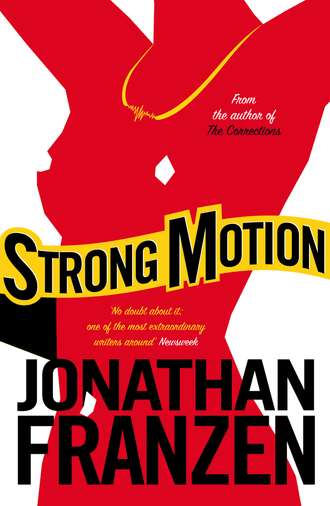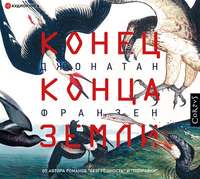
Полная версия
Strong Motion
He escaped to the bathroom. He washed his hair in the shower but forgot to wash the rest of himself. He stood naked and stared at the Bowleses’ Water Pik for several minutes and then mechanically began to take another shower. He washed his hair again and again forgot to wash anything else. It was as if he’d suddenly found himself on the brink of a deep, dark pool marked LAUREN and said What the hell, and let himself fall in.
An hour later, at the bottom of the stairs, he exchanged helios with another new face, a Texan youth with open, honest features and a military haircut who was reading the paper in the living room.
“Your lunch is on the table, Louis,” MaryAnn said quietly in the kitchen.
Louis stared at her. How could someone so irrelevant exist? Where was Lauren? Was he going to have to eat lunch with Lauren? He pointed vaguely east. “I need to get to the station,” he said.
“You want me to wrap it up for you? We were about to sit down.”
He felt a hand between his shoulder blades, Mr. Bowles propelling him towards the kitchen table. “You’ve got ten minutes, sit down a minute and prime that engine.”
“Aren’t you off the air this week?” said MaryAnn.
Cut in two diagonally, a caribou sandwich on a plate awaited him. The elder Bowleses attacked their own sandwiches with unusual appetite, ignoring the voices in the living room and the heavy footsteps on the stairs, gnawing at their food with tilted heads like starved and nervous animals driven into one corner of the house by a daughter who, with a loose gait and no apparent selfcon-sciousness, entered the kitchen just as a tough slab of gamey meat slid into the no man’s land between Louis’s sandwich and his mouth.
“Lauren, this is Louis. Louis, our daughter, Lauren.”
“Mumph,” Louis said.
“Hi nice to meet you,” Lauren said in a monotone. She was nothing like the mess or terror that MaryAnn had led him to expect. Her all-season tan, her turquoise earrings, her Mickey Mouse watch and the lazy way she turned one hip out all marked her as a mainstream good-times disaffected Texas college girl. She had smooth skin, a wide mouth, and permanent-looking bruises the color of iodine beneath her eyes. She’d written something in pen on the back of her hand. She told her parents that she and Emmett were driving to the beach at Galveston for the afternoon. Before she left the room she paused to take in Louis fully—his aviator frames, his thinning curls, his gutted sandwich, his searing blush. Her face became simply empty.
“We have a very open relationship with Lauren,” Mr. Bowles explained when she was gone.
“Emmett’s her fiancé,” Mr. Bowles added.
“We didn’t think she was coming down,” Mr. Bowles explained.
“She’s a wayward sprite,” Mr. Bowles said.
“God! Full of energy. Full of life,” Mr. Bowles reflected.
MaryAnn sank her teeth into her last piece of sandwich.
“I hope Emmett doesn’t let her drive,” Mr. Bowles concluded.
When Louis came home that night, the three Bowleses and Emmett were eating ice cream in the dining room. MaryAnn headed silently for the kitchen to get him dinner. “I’ve eaten,” he said, already on the stairs. At the top of them he stopped long enough to hear Lauren say:
“I guess he studies all the time, huh?”
“He’s a good worker,” Mr. Bowles affirmed.
“Gosh, that’s great,” Lauren said.
This was all he heard. Mouth wide open, eyes staring, he shut his door and dropped to the floor and stretched out on it. He didn’t get tired of being there. In his fever he heard Lauren and Emmett go out to a movie and return at twelve. He heard a Hide-A-Bed being opened for Emmett in Mr. Bowles’s study, and then a fever dream of voices, music, footsteps and opening and closing doors that seemed to last all night and involve dozens of people.
The next morning, at the Soundwaves branch on Main, he was rummaging through the Thelonious Monk LPs on station business when he became aware that Lauren Bowles was standing in the next aisle. She had her back to him. She was wearing a man’s shirt and was faintly pushing her head forward to the drum-machine-driven beat of optimistic British pop on the store stereo. She dropped a pair of CDs in their longboxes among JAZZ ARTISTS —B—, and flipped through Coleman, Coltrane, Corea. Then she leaned into the B’s again. Twice she made a short fierce movement with her shoulder, as if out of his sight she were wringing the necks of small animals, and then already she was leaving, glancing at crates of new releases near the cash registers.
Outside, Louis watched her drop to one knee and retie a sneaker between parked cars. Quarry seldom lets a hunter come as close as he came to her then. He was twenty feet behind her when she unbuttoned the lowest button of her shirt and gave birth to the pair of stolen CDs, which fell neatly into her purse. She flipped the flap down over them and crossed the street through traffic.
It was the Saturday before Easter. Everything at Rice was closed. Louis returned to Dryden Street with his purchases and found MaryAnn making toffee, a big soup pot of it that filled the house with a caustic smell of butter and sugar. Up in his room he opened Volume II of Flaubert’s collected letters on his desk. He hadn’t read a word of them when, some fifteen minutes later, the door behind him opened and closed.
Lauren was standing with one hand lingering on the doorknob, the lowest button of her shirt still unbuttoned, her eyes sweeping the room with a planning kind of thoughtfulness. After a moment she sat down on his desk and, shifting laterally, lowered herself onto Flaubert. The book’s spine broke audibly. “It’s Mister Dean’s List,” she said. “That’s your name, isn’t it?” For a moment she monitored Louis closely for a reaction.
“Where’s Emmett?” he said.
She leaned back on outstretched arms and knocked a jar of pens over. “He’s in Bay City visiting his grandfather. He asked me if I wanted to go, which was like real appealing when they keep talking about how his grandfather’s as yellow as a carrot. He’s got some disease.”
“Jaundice.”
“Wow. You must know everything.”
Louis kept his eyes on hers and hers avoided his.
“See my ring?” She dangled her left hand in his face. “It cost three thousand dollars. It’s a three-quarter-carat diamond. Do you like it?”
“No.”
“You don’t like it? What’s wrong with it?”
“The ugly little prongs here, to begin with.”
“Oh.” She took her hand back and breezily inspected the ring from various unilluminating angles. She had small, even spaces between her teeth. “They are, kind of, aren’t they. You’re pretty observant, I guess.”
Forgetting about the ring, she twisted around to take a book off a shelf, her knees rising for balance. “What’s this book?” She opened a critical study so far that its front and back covers touched and a chunk of pages fell on Louis’s lap. “Oops. Sorry. Hey, it’s French! You read French? Can you say something to me in French?”
“No.”
“Please?” The mockery in her voice had modulated into the tonal flatness of a girl who thinks a guy is being a jerk and who wants him to, like, stop? Please?
“Je ne veux pas parler français avec toi. Je veux commettre crimes avec toi.”
“God,” she said with deep sarcasm. “You’re good!”
The smell of toffee made his eyes and nose burn. His tiredness caught up with him in a rush. He had nothing to say. Lauren raised a leg and hopped lightly off the desk. “Do you like it here?” she asked. “Do you like my parents?”
“I guess you think I do, don’t you.”
She didn’t answer. Her shoulders had gone tense; she was looking at the door; she’d heard something in the hall. She touched Louis’s bed as if she were going to sit on it, but she changed her mind and ran on tiptoe to the door. She sat down on the carpeting and leaned her head against the keyhole, listening.
“Lauren?”
MaryAnn had spoken from halfway up the stairs. Lauren made her face stupid and mouthed her own name.
“Lauren?”
MaryAnn had climbed the remainder of the stairs and was coming up the hall. She stopped outside the door. This was the point at which Lauren closed her eyes and cried out sharply. She repeated it: a physical cry, a cry of pleasant surprise. Then she began to pant, and produce half-moaning coughs of fake transport, and drag her heels across the carpeting. She was glaring at Louis’s bed, and what she was doing with her feet was angry too.
Louis lowered his head over the broken Flaubert and laughed joylessly. MaryAnn was descending the stairs again. Lauren stood up and smiled cruelly at the floor, as if she had X-ray vision and could see her mother entering the dining room and slumping into one of the chairs along the wall. Then Louis’s bed attracted her attention. She stepped up onto it and started bouncing. Soon the springs were groaning and the one slightly shorter leg of the bed was tapping on the floor.
“Up — pan — down, up — pan — down,” she said. Her singsong words matched the rhythm of the springs. “In — nan — dout, in — nan — dout. Up — pan — down, up — pan — down. In — nan — dout, in — nan — dout—”
“Stop,” Louis said, more irritated than anything else. “She gets the message already.”
Lauren stopped. “Am I bothering you?”
“You’re fucked up,” he said without looking at her. “You’re really fucked up. And you’ve got the wrong idea about me.”
“But you like me, right?” she asked him from the doorway.
“Yeah, sure. I like you. I like you.”
Her new Eurythmies album was playing on her father’s audiophile-quality stereo when Louis slipped out and down the stairs and out the front door into air that didn’t smell like toffee. When he returned in the evening, from a long walk nowhere, he circled the house twice and didn’t see any sign of youth. Inside, Mr. Bowles told him that Lauren and Emmett had driven back to Beaumont to be with Emmett’s family for Easter Sunday. It was a full week before MaryAnn would speak to him again.
The retriever had come back. Louis, cold and stiff, watched her run arcs across the sand in front of him, nimble tangents along the retreating and advancing foam lines. He could hear voices from the direction of the parking lot. After a while the white air released three young or youngish figures who were fanned out on the beach and seemed to be combing it methodically. The one who passed right in front of him was a tall Oriental male in a down jacket and loose white yachting pants. He glanced gloomily at Louis, said, “Hey,” and scuffed on by, gouging divots in the sand out of disgust or some vandalistic impulse.
The person closest to the water was having a problem with the dog. He was a bearded Caucasian whose glasses were held on with a black elastic band. Jackie was snapping at his raised elbows. “Go! Go! Get away!” he commanded as she barked and tried to corner him between a pair of broken waves scissoring up onto the sand from two directions. He gave the air a vicious warning kick, and she retreated. Meanwhile the third person, a female with short black hair, had run on far ahead, her windbreaker and jeans fading into the whiteness. This was the person who, when the group returned in tighter formation a few minutes later, said, “I’m going to go ask this guy,” in a voice not low enough to escape Louis’s hearing. She came up the sand towards him. She had a small, pleasant face, with a short nose and pretty brown eyes. Her expres sion was fixed in an intense, frosty smileyness. “Sorry to bother you,” she said. “We were wondering if you’d been here for a while.”
The bearded Caucasian drew up behind her shoulder, and the thought went through Louis’s head that these people were plainclothes cops; they seemed so purposeful.
“Yeah,” he said. “Are you looking for something?”
Before she could answer, Jackie jumped on the bearded Caucasian, hooking her front claws on his belt and getting dragged along on tiptoe as he tried to pull away. Hands high, he turned reproachfully to Louis.
“Not my dog,” Louis said.
“We’re looking for disturbances in the sand,” the smiley woman said. She held her arm out to one side and snapped her fingers and snapped them again, just casually getting the dog’s attention, her eyes not leaving Louis. She was a few inches shorter than he and at least a few years older; there was some gray in her dark hair. “We thought that if you were here during the earthquake you might have seen something.”
He looked at her blankly.
“We’re from Harvard Geophysics,” the bearded Caucasian explained in a grating, impatient voice. “We felt the earthquake and got a rough location. It was big enough, we thought there might be some surface effects on the sand.”
Louis frowned. “Which earthquake is this?”
The woman glanced at the Caucasian. The dog was licking her fingers. “The earthquake an hour and a half ago,” she said.
“There was an earthquake an hour and a half ago?”
“Yes.”
“Around here?”
“Yes.”
“That you felt, wherever, down in Cambridge?”
“Yes!” Her smile had become one of genuine amusement at his confusion.
“Shit.” Louis scrambled stiffly to his feet. “I missed it! Or but, wait a minute, maybe it was not that big?”
With a loud sigh the bearded Caucasian rolled his eyes and headed back up the beach.
“It wasn’t small,” the woman said. “The magnitude will prob ably be about 5.3. The city’s not in ruins or anything, but a 5.3, that registers around the world. Our colleague Howard”—she aimed some smileyness at the Oriental, who was skipping stones between waves—”is quite happy about that, as you can see. It means a lot of information.”
Louis thought of the car with its theft alarm ringing.
“And you didn’t feel anything at all?” the woman said.
“Nothing.”
“Too bad.” She smiled strangely, looking him right in the eye. “It was a nice earthquake.”
He looked around, still disoriented. “You expected the beach to be all torn up?”
“We were just curious. Sometimes the sand subsides and cracks. It can also liquefy and boil up to the surface. There was an event here about two hundred fifty years ago that did some serious damage. We were hoping we’d see something like that. But—” She clicked her tongue. “We didn’t.”
By the water’s edge her colleague Howard was playing with the dog, tapping her behind the ears with alternating hands while her head thrashed back and forth. Louis still didn’t believe there had really been an earthquake. “Would a house around here be wrecked?”
“Depends on what you mean by wrecked,” the woman said. “You have a house?”
“It’s my mother’s house. My ex-grandmother’s house, which you couldn’t possibly care less about, but she was the person who died in the earthquake last week.”
“No! Really?” Concern became the woman better than amusement did. “I’m very sorry.”
“Yeah? I’m not. I hardly knew her.”
“I’m really sorry.”
“What you sorry about?” Howard asked her, coming up from the water.
The woman indicated Louis. “This … person’s grandmother was the one who died in the April 6 event.”
“Bad luck,” Howard said. “Usually, small earthquake like that, nobody dies.”
“Howard is an expert in shallow seismicity,” the woman said.
Howard squinted into the white sky as though wishing this description of him weren’t accurate. He had a hairstyle like half a coconut.
“What about you?” Louis asked the woman.
She looked away and didn’t answer. Howard slapped the dog on the muzzle and fled, taking crazy evasive action as the dog pursued him. The woman backed away from Louis, her smileyness assuming a leave-taking chill. When she saw that he was following her, a flicker of alarm crossed her face and she began to walk very briskly. He buried his hands in his pockets and matched her footsteps with his own. He had a faint predatory interest in this small-boned female, but mainly he wanted information. “There really was an earthquake?”
“Yes, uh-huh. There really was.”
“How’d you know it was up here?”
“Oh … instruments plus an educated guess.”
“So, and what’s causing these earthquakes?”
“Rupture of stressed rock along a fault a few miles underneath us.”
“Can you be a little more specific?”
She became smiley and shook her head. “No.”
“Are there going to be any more?”
She shrugged. “Definitely yes if you’re willing to wait a hundred years. Probably yes if you wait ten years. Probably not if you leave here in a week.”
“It doesn’t mean anything to get two earthquakes in a row like this?”
“Nope. Not particularly. In California it might mean something, but not here. I mean, of course it means something; but we don’t know what.”
She spoke as though she wanted to be precise for precision’s sake, not for his. “As a rule,” she said, “if you feel an earthquake around here, it’s happening on a fault that nobody even knew was there, at some peculiar depth, in the context of local stresses that are pretty much anybody’s guess. You have to be a fundamentalist minister to make predictions right now.”
The white hairs she had ran across the grain of the darker hair, lying on top of it rather than blending in. Her skin was cream-colored.
“How old are you?” Louis asked.
A pair of startled and unamused eyes came to rest on him. “I’m thirty, how old are you?”
“Twenty-three,” he said with a frown, as if a calculation had yielded an unexpected result. He asked her what her name was.
“Renée,” she said grimly. “Seitchek. What about you?”
In the parking lot Howard was stepping on the belly of a delighted Jackie and the bearded Caucasian was leaning against a ridiculous automobile, a low-slung late-seventies sedan with a bleached and peeling vinyl roof and rippling white flanks, gray patches of reconstruction, and no hubcaps. It was an AMC Matador. The bearded Caucasian had a long face and red lips. The lenses of his glasses were shaped like TV screens, and the cuffs of his jeans were tucked into the tops of brown work boots. Simply because she had stopped by his side, the half-full glass of Renée’s attractiveness became half-empty.
The Matador apparently belonged to Howard. “You need a ride someplace?” he said to Louis.
“Sure, maybe to my house.”
“If I were you,” the bearded Caucasian said, “I’d go back right away and make sure everything’s OK.”
Renée pointed at Louis. “That’s what he’s doing, Terry. He’s going right back.”
“That’s what I’m saying,” Terry said. “That’s all I’m saying.”
Renée looked away and made a face. Howard unlocked the car, and Louis and Terry got in the back seat, sinking ankle-deep into pizza cartons, Coke cans, and sportswear. The car radio came on with the engine. It was playing a Red Sox game.
“Where’s the dog?” Renée said.
Howard shrugged and put the car in reverse.
“Howard, wait, you’re going to run over it.”
They peered out their respective windows, trying to locate the dog. Louis took it upon himself to get out and look behind the car, the exhaust pipe of which was putting out blue-black clouds of the foulest smoke he’d ever smelled a car produce. It coated his res piratory tract like some poison sugar. He got back in the car, reporting no dog.
“This is Louis, incidentally,” Renée explained to Terry from the front seat. “Louis, this is Terry Snail and Howard Chun.”
“You’re all seismologists,” Louis said.
Terry shook his head. “Renée and Howard are the seismologists. They’re real high-powered.” There seemed to be a backhanded message here, Terry either not really believing the other two to be high-powered or else implying that to be high-powered was not the same as to be a worthwhile person. “Renée told me your grandmother died in last week’s earthquake,” he said. “That’s awful.”
“She was old.”
“Howard and Renée thought it was a nothing earthquake. They were saying it was no good. They wanted it to be bigger. That’s how seismologists think. I think it’s terrible about your grandmother.”
“Yeah, we don’t, Terry. We’re glad she died.”
“I’m not saying that.”
“What do you think he is saying, Howard?”
Howard turned the steering wheel obliviously, the car chugging and rumbling like a ferry boat. Louis looked out the back window, expecting to see the dog, but the lot the trash barrels guarded was completely empty now.
… Two balls and two strikes, the baseball announcer said.
“Two balls and one strike,” Renée said.
… The two-two pitch …
“The two-orae pitch,” Renée said.
Ball three, three and two. Roger had him oh and two and now he ‘s gone to a full count.
“One strike, airbrain. Three balls and one strike.”
… Scoreboard has it as three balls and one strike.
… Bob, the color man said, I think it is three and one.
Renée turned off the radio in disgust, and Terry remarked, ostensibly to Louis: “Nothing’s ever quite good enough for Renée.”
In the front seat Renée turned to Howard and made a gesture of utter bafflement.
“I wonder if they felt the earthquake at the ballpark,” Terry said.
“Yeah, I wonder,” Renée said. “They’re playing in Minnesota.”
“Left at the sign,” Louis told Howard. He hardly recognized the road they were on as the one down which he’d jogged.
“Where you wanna go next?” Howard asked generally. “Try Plum Island?”
“We better head back,” Terry said.
“What a drag,” Renée said.
“No death and destruction,” Terry said.
“No sand blows is all I meant. Although it’s true,” she said to Louis, “that we feel some ambivalence about destructive earthquakes. They’re like cadavers, full of information.”
Her articulateness was getting on Louis’s nerves. He pointed out the stone Kernaghan gate, and Howard hardly slowed the car as he started to turn. Then he slammed on the brakes and wheeled hard to the right, the car skidding almost sideways back onto the road. A black Mercedes swung out of the gate and swerved around them and sped off towards Ipswich. It was driven by a man Louis recognized as Mr. Aldren. Very belatedly, Howard applied the horn.
“See if you can kill me,” Renée said, pressing with one hand on the windshield and sliding back on the seat cushion she’d been thrown from.
A strange and new and not entirely unpleasant sensation came over Louis as they drove up the hill and he saw, as these students were seeing, the money the estate represented. It was a sensation of exposure but of satisfaction too. Money: it says: I’m not nobody. The awed silence in the car held until the house and its party hat came into view and Renée laughed. “Oh my God.”
“You ought to come inside,” Louis said on a wealthy man’s impulse. “Have some food, see some damage.”
Terry was quick to shake his head. “No thanks.”
“No, no,” Louis insisted. “Come in.” He was thinking how unwelcome his mother would find these visitors. “I mean, if you’re at all curious.”
“Oh, we’re curious,” Renée said. “Aren’t we, Howard? It’s our business to be curious.”
“I just hope no one’s hurt,” Terry said.
Not until Louis had opened the door and ushered everyone inside did he realize how little he’d believed there’d been an earthquake. And what he felt most strongly, as he stopped in the front hall, was that he was seeing the work of an angry hand. The minister who’d said that God was angry with the Commonwealth; the Haitian who’d believed there was an angry spirit in the house: he saw what they were getting at, for a force had entered the house while he was away and had attacked it, pulling a piece of plaster from the dining-room ceiling and flinging it onto the table, where water from broken vases had soaked the plaster brown. The force had thrown open the doors of the breakfront, toppled anything more upright than horizontal and scattered china polyhedra across the floor. It had yanked on paintings in the living room, trashed the bar and opened cracks across the walls and ceiling. The room smelled like a frat house on a Sunday morning.








